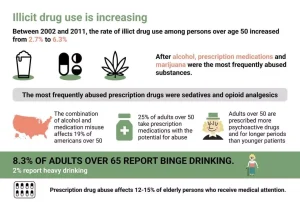People often confuse alcohol intolerance and alcohol allergy, but they aren’t the same condition. Rarely, severe pain after drinking alcohol is a sign of a more serious disorder, such as Hodgkin’s lymphoma. Alcohol intolerance occurs when your body doesn’t have the proper enzymes to break down (metabolize) the toxins in alcohol.
Tolerance, Dependence, or Addiction?
People who regularly drink any amount of alcohol can become tolerant to these impairments and show few signs of intoxication – even when there are large amounts of alcohol in their bloodstream. If these drinkers stop or reduce their alcohol consumption, this tolerance could be lost. It develops over time, meaning that a dedicated drinker may need consistently higher volumes of alcohol to achieve the same physical effects over the weeks and months of drinking. The adaptation to the effects of drinking is what leads to high tolerance for alcohol. Reports have shown that different individuals have varying degrees of tolerance.
- People who go to clubs or pubs regularly become so used to the environment where they develop AT while they are in that environment.
- Several studies comparing sons of fathers with AUD to sons of fathers who did not have AUD found tolerance differences that could affect drinking behavior.
- However, it’s not the only cause and developing a tolerance does not mean that you’ve developed an alcohol addiction.
- We’re not saying we never do this, we’re just saying that you should be careful when you do.
- This enzyme is our strong defense against the highly toxic effects of non-metabolized alcohol on the nervous and cardiac systems.
Risk Factors for Functional Alcoholics
With an allergy, the body’s immune system fights the substance, as it perceives it as a threat. When it comes to an intolerance, the body simply isn’t up to the task of breaking it down. Alcohol build up alcohol tolerance allergies are very rare, while intolerance is quite common. When you’re whizzing like a donkey every ten minutes, you aren’t just losing water, you’re losing some important nutrients.
How can I learn to live with alcohol intolerance?
Calls to our general hotline may be answered by private treatment providers. We may be paid a fee for marketing or advertising by organizations that can assist with treating people with substance use disorders. To find another treatment program, browse the top-rated addiction treatment facilities in each state by visiting our homepage, or by viewing the SAMHSA Treatment Services Locator. The helpline at AddictionResource.net is available 24/7 to discuss the treatment needs of yourself or a loved one.
No Link Between Light Drinking and Longer Life, Study Finds
This helpline is answered by Legacy Healing Center, an addiction treatment provider with treatment facilities in California, Florida, Ohio, and New Jersey. The exact timeline, however, may depend on a number of factors, including how often you drink, the amount, and other personal and biological factors. Typically this begins with an alcohol detox program, to help you safely withdraw from alcohol under medical supervision. According to the Alcohol Pharmacology Education Partnership at Duke University, this is due to variations in the activity and amount of an enzyme responsible for metabolizing alcohol—alcohol dehydrogenase (ADH). While the research is unclear, some studies suggest that people with darker-colored eyes may tend to have a higher alcohol sensitivity on average.
- As a result, you’ll feel the intoxicating effects even from lower amounts of alcohol.
- Studies have also found that metabolic tolerance can lead to the ineffectiveness of some medications in chronic drinkers and even in people recovering from alcohol use disorder (AUD).
- It may be a good idea for those with a full alcohol intolerance to see a doctor to rule out any potential medical causes, and to undergo allergy testing.
How To Increase Your Drinking Tolerance (So You Don’t Make an Ass of Yourself at a Holiday Party)
- Alcohol allergies are very rare, while intolerance is quite common.
- For example, you may find that you are able to “hold” your alcohol better than you used to.
- Acetaldehyde starts to build up in your blood and tissues, causing symptoms.
Symptoms of an alcohol allergy include rashes, itchiness, swelling and severe stomach cramps. Allergy symptoms are often more painful and uncomfortable than alcohol intolerance symptoms. In rare cases, if untreated, an alcohol allergy can be life-threatening.
Functional Tolerance Can Result in Dependence
On the other hand, it would be best for people with alcohol intolerance to stay away from alcohol completely, as this is the only way to avoid symptoms and side effects. Obviously, ABV (alcohol by volume) is critical in determining how drunk you’ll get, but there are other factors, too. Red wine and darker spirits like whiskey generally contain more congeners than clear, i.e. chemicals that can give you a headache and add to your sense of inhibition after just an hour or two. People react differently, so you may want to do some spot testing before game-day.
- This is called behaviorally augmented tolerance or learned tolerance.
- Thus, we initiated a study of tolerance ‘training’ and its association to risky and heavy drinking.
- Several studies have shown that sons of alcoholics were less impaired during drinking bouts compared to sons of non-alcoholics.
- It is a contest to see who can “hold their liquor” or drink without being significantly affected by alcohol.
These might be signs of alcohol intolerance, an inherited disorder. While there is no cure for this condition, avoiding alcohol helps you stay symptom-free. It’s important to note that it takes more than a weekend of abstinence to reset alcohol tolerance. Tolerance may begin to diminish after a few days, but it may take two weeks to return your tolerance level to normal. Tolerance can develop quickly; a few days to a week of heavy drinking can cause it to take several beers for you to feel a buzz. You may think that not having alcohol interfere with your behavior and ability to function like it used to be is a positive occurrence.
Functional Tolerance
Have you ever known someone who could consume large amounts of alcohol and not display any obvious signs of intoxication? That is because that person has developed a functional tolerance to alcohol. The rapid elimination of alcohol from the system due to the presence of certain liver enzymes is called metabolic tolerance. The enzyme reduces the time in which alcohol effects are felt; this means that alcohol intoxication is greatly reduced in the individual. Some individuals have increased levels of this enzyme, while some do not.




